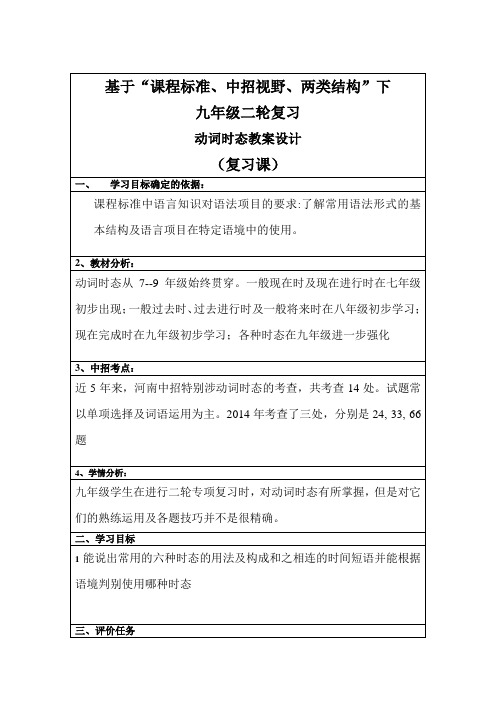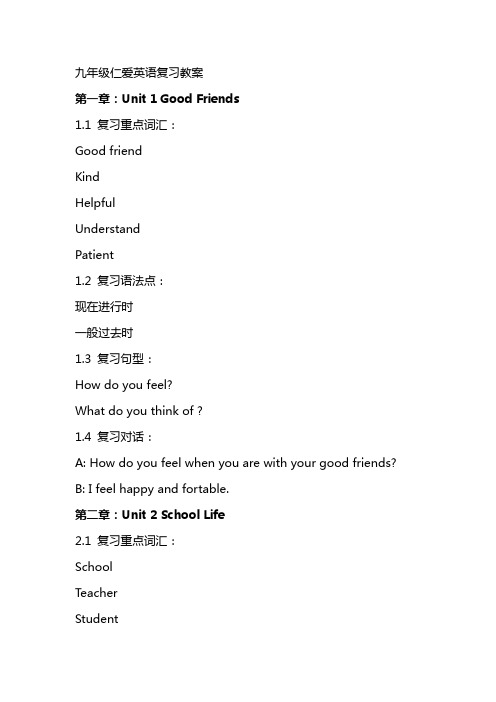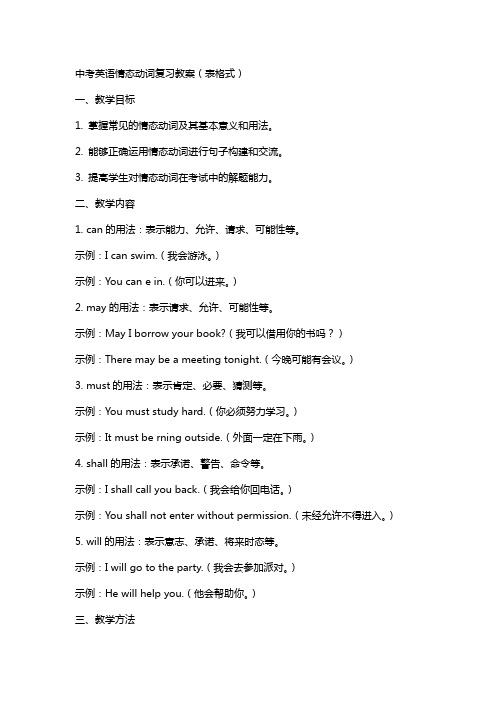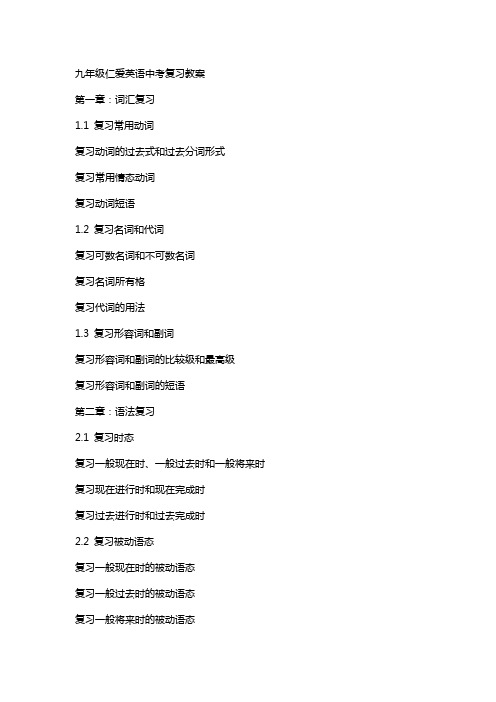仁爱版九年级英语中考二轮专题复习教案:(情态动词)教案
仁爱版九年级英语中考二轮专题复习教案:教案

A. the fashion B. the Internet C. the blog
2. Which of the following is NOT TRUE?
A. Teenagers don’t tell about their personallife in their blogs.
自学时间:3分钟
自学要求:独立看书,独立思考.
自学检测2
解题技巧:
1.抓住主题句,锁定文章主旨
2.抓住段落大意,概括中心思想
3.抓住主线和关键,归纳文章中心
自学指导3
自学内容:细节理解题解题技巧.
自学方法:查阅手中资料。
自学时间:3分钟
自学要求:独立看书,独立思考.
自学检测3
解题技巧:
(1)细心审题,直接就题找答案。
4、学情分析:
阅读水平不高,需要加强练习
二、学习目标
据上下文和构词法推断、理解生词的含义
能理解段落中各句子之间的逻辑关系
能读懂常见体裁的阅读材料
三、评价任务
1、针对学习目标一,要求学生据上下文和构词法推断词义。
2.针对学习目标二,要求学生能理解段落中各句子之间的逻辑关系
四、教学过程
学习目标
教学活动
评价Байду номын сангаас点
However, many parents are worried about these young bloggers. Parents see the kids talking about how they got drunk last weekend and how they don't like studying. They are using the language that is surprising to their parents. Besides hearing from their friends, teen bloggers also get messages from strangers. Most of the time, it's older men asking to meet teenage girls. "These strange men are dangerous for my kids. They sometimes teach my kids bad words." said Cara Cabral, a mother of two children.
仁爱版九年级英语中考二轮专题复习教案:动词时态复习

一、找几位同学口头回答:说出一般将来时和现在完成时的用法和构成,并能说出与之相连的时间短语
二、做题检测是否能准确运用
1. We have no more vegetables in the fridge. I ____and buy some.
A.go B.went C.will go D.was going
—David? Never! He_____or activities.
A.hates B.hated C.is hating D.has hated
2.—What does Tom’s uncle do?
—He is a teacher. He __physics at a school now.
——Really? But I ____ it yet.
A.didn’t see B.won’t see
C.haven’t seen D.am not seeing
7.——Jim isn’t in the classroom. Where is he now?
——He _____ the library.
A.will go to B.has been to
C.has gone to D.goes to
8. The zoo keeper is worried because the number of visitors_____smaller and smaller.
A.become B.are becoming
复习检测:2
一、找几位同学口头回答:说出现在进行时和过去进行时的用法和构成,并能说出与之相连的时间短语
二、做题检测是否能准确运用
1.—Are your parents at home , Jane?
九年级仁爱英语复习教案

九年级仁爱英语复习教案第一章:Unit 1 Good Friends1.1 复习重点词汇:Good friendKindHelpfulUnderstandPatient1.2 复习语法点:现在进行时一般过去时1.3 复习句型:How do you feel?What do you think of ?1.4 复习对话:A: How do you feel when you are with your good friends? B: I feel happy and fortable.第二章:Unit 2 School Life2.1 复习重点词汇:SchoolTeacherStudentClassroomHomework2.2 复习语法点:一般现在时一般过去时2.3 复习句型:What does he/she look like?What does he/she do?2.4 复习对话:A: What does your teacher look like? B: My teacher is tall and thin.第三章:Unit 3 Colors3.1 复习重点词汇:ColorRedBlueGreenYellow3.2 复习语法点:一般现在时一般过去时3.3 复习句型:What color is it?I like3.4 复习对话:A: What color is your favorite? B: My favorite color is blue.第四章:Unit 4 Seasons4.1 复习重点词汇:SeasonSpringSummerAutumnWinter4.2 复习语法点:一般现在时一般过去时4.3 复习句型:What season is it?I like season.4.4 复习对话:A: What season is your favorite? B: My favorite season is spring. 第五章:Unit 5 FoodFoodRiceMeatVegetableFruit5.2 复习语法点:一般现在时一般过去时5.3 复习句型:What do you like to eat?Do you like?5.4 复习对话:A: What do you like to eat?B: I like to eat rice and vegetables. 第六章:Unit 6 Animals6.1 复习重点词汇:AnimalCatDogFishBird一般现在时一般过去时6.3 复习句型:What animal do you like? Does it like?6.4 复习对话:A: What animal do you like? B: I like dogs.第七章:Unit 7 Clothing 7.1 复习重点词汇:ClothingShirtPantsDressSkirt7.2 复习语法点:一般现在时一般过去时7.3 复习句型:What clothes do you like? What size do you wear?A: What clothes do you like? B: I like shirts and pants.第八章:Unit 8 Health8.1 复习重点词汇:HealthDoctorHospitalMedicineExercise8.2 复习语法点:一般现在时一般过去时8.3 复习句型:How are you?Do you need?8.4 复习对话:A: How are you?B: I'm fine, thank you.第九章:Unit 9 Travel9.1 复习重点词汇:TravelPlaceVisitTouristGuidebook9.2 复习语法点:一般现在时一般过去时9.3 复习句型:Where do you want to go?Do you want to?9.4 复习对话:A: Where do you want to go? B: I want to visit the Great Wall. 第十章:Unit 10 Nature10.1 复习重点词汇:NatureTreeFlowerSunMoon10.2 复习语法点:一般现在时一般过去时10.3 复习句型:What do you like about nature? Does it like?10.4 复习对话:A: What do you like about nature? B: I like the beautiful flowers and trees. 第十一章:Unit 11 Science11.1 复习重点词汇:ScienceExperimentTheoryScientistDiscovery11.2 复习语法点:一般现在时一般过去时11.3 复习句型:What is science?What discovery didmake?11.4 复习对话:A: What is science?B: Science is the study of the natural world. 第十二章:Unit 12 Technology12.1 复习重点词汇:TechnologyComputerInternetMobile phoneInvention12.2 复习语法点:一般现在时一般过去时12.3 复习句型:What technology do you like?How does technology affect?12.4 复习对话:A: What technology do you like?B: I like smartphones and the internet.第十三章:Unit 13 Environment13.1 复习重点词汇:EnvironmentPollutionRecyclingNatureConservation13.2 复习语法点:一般现在时一般过去时13.3 复习句型:What is the environment?How can we protect?13.4 复习对话:A: What is the environment?B: The environment is everything around us. 第十四章:Unit 14 Culture14.1 复习重点词汇:CultureTraditionFestivalArtLanguage14.2 复习语法点:一般现在时一般过去时14.3 复习句型:What is culture?What is your favorite?14.4 复习对话:A: What is culture?B: Culture is the way of life for a group of people.第十五章:Unit 15 Self-study15.1 复习重点词汇:Self-studyHabitSkillImprovementGoal15.2 复习语法点:一般现在时一般过去时15.3 复习句型:What is self-study?How can we improve?15.4 复习对话:A: What is self-study?B: Self-study is studying yourself to achieve your goals. 重点和难点解析重点词汇:每个章节中出现的重点词汇,如“good friend”、“school life”、“colors”、“seasons”、“food”等。
仁爱版九年级英语中考二轮专题复习教案动词不定式复习课案

(2)特点:
A .没有人称和数的变化
B .可以有自己的宾语和状语
C .有时态和语态的变化(被动语态的形式为to be +动词过去分词
动词不定式在句子中的作用
作宾语:动词+ to do
常见动词有agree,decide ,fail, hope, wish , want, plan等
动词+宾语+to do
Li Meiaskedme to show her the new dictionary .
注:有以上结构的常用动词有tell. wish, ask, want , like, beg, invite,warn, allow,encourage,advise等。
动词+宾语+ do(不带to的不定式)
A. Getting B. To get C. Get D. Got
4.More and more young people are trying to do something_B__ the old.
A. served B. to serve C. serve D. serves
一、
通过复习巩固动词不定式及做习题、达到能掌握并灵活运用。
自学检测1
1. My mother often asks me __D___ some cleaning on Sundays
A do B. does C. did D. to do
2. –Do you often hear John _C____in his room ?
– Listen! Now we can hear him ____ in his room .
仁爱版九年级英语中考二轮专题复习教案:教案

3、动词+名词/代词:常见的有take place,make friends等
4、动词+副词+介词:常见的有look down upon,go on with
5、动词+名词/代词+介词:常见的有take care of
6、be+形容词+介词be angry with
A come in B come over C come out D come on
2. _ Dad ,math is too difficult for me .
_Maybe a little, but don’t-- ---,dear. I can help you .
A. give up it B give it up C give it away
2、能准确总结出动词词组及其构成,会运用这一方法,熟练做题。
3、能牢记主要的动词词组,明辨词义的不同,并运用这一方法,熟练做题。
三、评价任务
1、针对目标1,以小组竞赛,同桌讨论的方式总结出动词分类,通过分析动词的不同,能说出各类动词的用法
2、针对目标2,以小组讨论,同桌讨论的方式总结出动词词组的分类,理解掌握动词词组的关键特征
A good B well C. bad D. badly
4_ Is the man over there Mr . Brown ?
_ It _ _him .he has gone to Brizil to watch the 2014 FIFA Word C up.
A may not be B can’t be C. shouldn’t be D. mustn’t be
3.--Although I waited for two hours yesterday afternoon ,my good friend didn’t ——at the airports.
中考英语 情态动词复习教案(表格式)

中考英语情态动词复习教案(表格式)一、教学目标1. 掌握常见的情态动词及其基本意义和用法。
2. 能够正确运用情态动词进行句子构建和交流。
3. 提高学生对情态动词在考试中的解题能力。
二、教学内容1. can的用法:表示能力、允许、请求、可能性等。
示例:I can swim.(我会游泳。
)示例:You can e in.(你可以进来。
)2. may的用法:表示请求、允许、可能性等。
示例:May I borrow your book?(我可以借用你的书吗?)示例:There may be a meeting tonight.(今晚可能有会议。
)3. must的用法:表示肯定、必要、猜测等。
示例:You must study hard.(你必须努力学习。
)示例:It must be rning outside.(外面一定在下雨。
)4. shall的用法:表示承诺、警告、命令等。
示例:I shall call you back.(我会给你回电话。
)示例:You shall not enter without permission.(未经允许不得进入。
)5. will的用法:表示意志、承诺、将来时态等。
示例:I will go to the party.(我会去参加派对。
)示例:He will help you.(他会帮助你。
)三、教学方法1. 实例讲解:通过具体例句讲解每个情态动词的用法。
2. 表格对比:列出各情态动词的用法表格,进行对比分析。
3. 练习巩固:设计相关练习题,让学生巩固所学内容。
4. 小组讨论:分组讨论情态动词的用法,促进学生互动。
四、教学步骤1. 导入:简要介绍情态动词的概念及重要性。
2. 讲解:分别讲解每个情态动词的用法,并结合实例演示。
3. 对比:展示各情态动词用法表格,让学生进行对比分析。
4. 练习:设计练习题,让学生进行课堂练习。
5. 讨论:分组讨论练习题,引导学生互相交流心得。
九年级英语专题复习教案动词

一、教案主题:九年级英语专题复习教案动词二、教学目标:1. 理解动词的分类及用法。
2. 掌握动词的时态、语态和语态的转换。
3. 提高学生运用动词进行交际的能力。
三、教学内容:1. 动词的分类:行为动词、助动词、情态动词。
2. 动词的时态:一般现在时、一般过去时、一般将来时、现在进行时、过去进行时、将来进行时。
3. 动词的语态:主动语态、被动语态。
4. 语态的转换:主动语态转为被动语态,被动语态转为主动语态。
四、教学过程:1. 导入:通过图片和场景,引出动词的概念,激发学生的学习兴趣。
2. 讲解:讲解动词的分类、时态、语态及语态的转换。
3. 互动:学生分组讨论,举例说明动词的用法,进行动词接龙游戏。
4. 练习:设计练习题,让学生运用动词进行句子的编写和翻译。
5. 总结:对本节课的内容进行总结,强调重点和难点。
五、课后作业:1. 复习本节课所学内容,整理笔记。
2. 完成课后练习题,巩固所学知识。
3. 结合日常生活,尝试运用动词进行交际。
六、教案主题:九年级英语专题复习教案动词——一般现在时七、教学目标:1. 掌握一般现在时的构成和用法。
2. 能够正确运用一般现在时描述经常性和习惯性的动作。
3. 提高学生在实际情境中运用一般现在时的能力。
八、教学内容:1. 一般现在时的构成:主语+ 动词原形。
2. 一般现在时的用法:描述经常性和习惯性的动作、状态、特点等。
3. 一般现在时的特殊句式:there be句型、疑问句、否定句。
九、教学过程:1. 导入:通过图片和场景,引导学生回顾一般现在时的概念。
2. 讲解:讲解一般现在时的构成、用法和特殊句式。
3. 互动:学生分组讨论,举例说明一般现在时的用法,进行一般现在时的句子接龙游戏。
4. 练习:设计练习题,让学生运用一般现在时进行句子的编写和翻译。
5. 总结:对本节课的内容进行总结,强调重点和难点。
十、课后作业:1. 复习本节课所学内容,整理笔记。
2. 完成课后练习题,巩固所学知识。
九年级仁爱英语中考复习教案

九年级仁爱英语中考复习教案第一章:词汇复习1.1 复习常用动词复习动词的过去式和过去分词形式复习常用情态动词复习动词短语1.2 复习名词和代词复习可数名词和不可数名词复习名词所有格复习代词的用法1.3 复习形容词和副词复习形容词和副词的比较级和最高级复习形容词和副词的短语第二章:语法复习2.1 复习时态复习一般现在时、一般过去时和一般将来时复习现在进行时和现在完成时复习过去进行时和过去完成时2.2 复习被动语态复习一般现在时的被动语态复习一般过去时的被动语态复习一般将来时的被动语态第三章:听力训练3.1 听力材料的选择选择与中考难度相近的听力材料选择涉及中考常见话题的听力材料3.2 听力技巧的培养培养预测听力材料内容的能力培养关键词的捕捉能力培养信息的整合和归纳能力第四章:阅读理解4.1 阅读材料的选择选择与中考难度相近的阅读材料选择涉及中考常见话题的阅读材料4.2 阅读技巧的培养培养快速阅读和略读的能力培养理解阅读材料的主旨和大意的能力培养根据上下文推断未知词义的能力第五章:写作训练5.1 写作话题的选择选择与中考常见话题相关的写作题目选择能够激发学生兴趣和思考的写作题目5.2 写作技巧的培养培养写作前的构思和计划能力培养写作中的语言表达和逻辑思维能力培养写作后的修改和润色能力第六章:单项选择6.1 题型分析分析中考单项选择题的常见题型和出题规律总结解题技巧和策略6.2 解题训练提供大量真题和模拟题进行练习针对不同题型进行专项训练第七章:完形填空7.1 题型分析分析中考完形填空题的常见题型和出题规律总结解题技巧和策略7.2 解题训练提供大量真题和模拟题进行练习针对不同题型进行专项训练第八章:句子填空8.1 题型分析分析中考句子填空题的常见题型和出题规律总结解题技巧和策略8.2 解题训练提供大量真题和模拟题进行练习针对不同题型进行专项训练第九章:短文改错9.1 题型分析分析中考短文改错题的常见题型和出题规律总结解题技巧和策略9.2 解题训练提供大量真题和模拟题进行练习针对不同题型进行专项训练第十章:中考模拟试题10.1 模拟试题的编制根据中考难度和题型编制模拟试题涵盖中考常见话题和考点10.2 模拟试题的解答和分析提供模拟试题的解答和答案对模拟试题进行详细分析和讲解重点和难点解析重点环节一:动词的过去式和过去分词形式需要重点关注动词的过去式和过去分词形式的正确运用,这是中考英语的基础知识。
- 1、下载文档前请自行甄别文档内容的完整性,平台不提供额外的编辑、内容补充、找答案等附加服务。
- 2、"仅部分预览"的文档,不可在线预览部分如存在完整性等问题,可反馈申请退款(可完整预览的文档不适用该条件!)。
- 3、如文档侵犯您的权益,请联系客服反馈,我们会尽快为您处理(人工客服工作时间:9:00-18:30)。
学生对情态动词有初步的掌握,但并没有进行集中分析,归纳,和练习。尤其 情态动词间的辨析仍是学生的薄弱环节,容易出错,应多加练习。 二、复习目标 1、能说出情态动词的分类及用法,会熟练做题。 2、能进行情态动词的辨析,并熟练做题。
三、评价任务
1、针对目标 1,通过思考、讨论,让学生说出情态动词的分类及用法,会熟练 做题。 2、针对目标 2,通过思考、讨论,让学生对情态动词进行辨析,并灵活运用。 四、教学过程 复 习 教学活动 目标
-No, I____ A. mustn't B. can't C. needn't D. may not
will(would), need, have(has/had) to, used to , ought to 的用法
2、 针对目 标 2,通 过思考、 讨论,让 学生对情 态动词进 并 熟 行辨析, 练 做 复习检测二 并灵活运 1.He said that you __________ watch TV all the 用。 题。
说 出 情 态 动 词 的 分 类 及 用法, 会 熟 练 做 题。
1、 针对目 标 1,通 过思考、 讨论,让 学生说出 复习检测一: 情态动词 的分类及 1. -May I take this book out? 用法,会 -No, you___ A. can‘t B. may not C. needn’t D. aren‘t 熟 练 做 2.You___ go and see a doctor at once 题。 because you're got a fever. A. can B. must C. dare D. would 3. -Can you speak Japanese?
目 标 1:能 复习指导一 复习内容:情态动间:10 分钟。 复习要求:能熟练掌握情态动词,并能在不同语 境中熟练运用。
评价要点 要点归纳 情态动词:又叫 情态助动词,表 示说话人对有 关行为或事物 的态度和看法, 认为其可能、应 该或必要等。情 态动词 + 动词原 形。情态动词有 四类。 及 can(could), may(might), must , shall(should),
基于“课程标准、中招视野、两类结构” 九年级专题复习“情态动词”教案设计 (复习课)
一、 复习目标确定的依据: 1、课程标准相关要求:《英语课程标准》 (2011 年版)要求学生能够理解并运用 情态动词。 2、教材分析: 情态动词是词类专项复习的一个尤为重要的知识点。情态动词虽然分类不多, 但考题灵活多变,仍需重点强化。 3、中招考点: 通常 can/could, may/might, must, need, shall/should, will/would 的辨析是常考点
目标 2: 复习指导二 能 进 复习内容:情态动词的辨析。 行 情 复习方法:独立理解记忆,同桌互提。 态 动 复习时间:10 分钟。 词 的 复习要求:能熟练掌握情态动词辨析,并能在不 辨析, 同语境中熟练运用 evening if you wished. A. may B. must C. can D. might 2.-Is John coming by train? --He should, but he __________ not. He likes driving his car. A. must B. can C. need D. may 3. Peter __________ come with us tonight, but he isn't very sure yet. A. must B. can C. may D. will 4. Michael __________ be a policeman, for he's much too short. A. needn't B. can't C. shouldn't D. won't 当堂训练: ( )1.—Who is the man over there? Is it Mr. Li? — No, it ______ be him. Mr. Li is much taller. A. mustn’t B. may no C. can’t D. needn’t ( )2.—Must I go with them tomorrow? — No,you ______. A. mustn ‘t B. shouldn't C. needn't D. can't ( ) 3. —______ I take some photos in the hall? — No, you ______. A. Can, needn ’ t B. Must,
分 析 归 纳 出 must/can’t, must/ have to, can / ba able to, maybe/ may be 的 区别
mustn’t C. Could, won’t mustn’t D. May,
